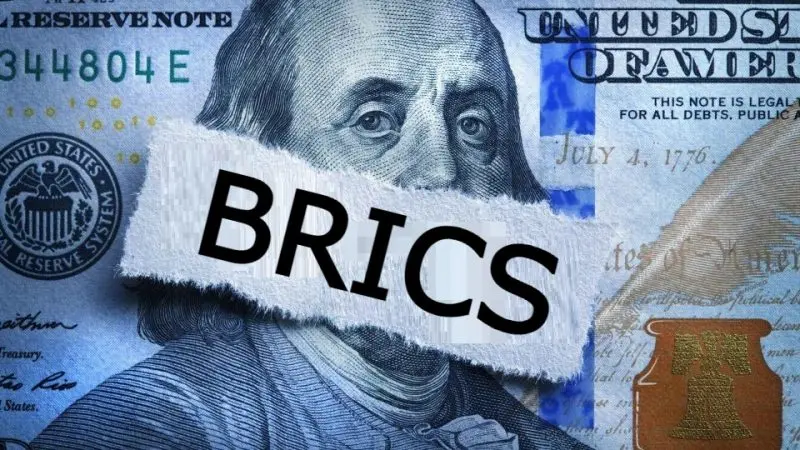US Dollar’s Global Reserve Share Falls to 59% in 2024
The US dollar, long considered the world’s leading reserve currency, has seen a significant decline in its share of global reserves.
In 2024, the dollar’s share dropped to 59%, a notable decrease from the 72% it held in 2002. This 13% decline over the last 22 years reflects a growing global shift away from the dollar, particularly among countries within the BRICS bloc.
Join our WhatsApp ChannelBRICS Nations Lead De-Dollarization Efforts
The BRICS nations—Brazil, Russia, India, China, and South Africa—have been vocal in their efforts to reduce reliance on the US dollar.
Over the past two years, they have intensified initiatives to promote the use of their national currencies in international trade. China, in particular, has been at the forefront of this movement.
“China’s push to expand its Cross-Border Interbank Payment System (CIPS) is a clear signal that the country is serious about creating alternatives to the dollar,” said a financial analyst familiar with the matter.
Between June 2023 and May 2024, CIPS saw the addition of 62 new participants, bringing the total to 142 direct and 1,394 indirect participants.
This expansion of CIPS is seen as a direct challenge to the dollar’s dominance. However, despite China’s efforts, the yuan’s share in global reserves slipped from 2.8% in 2022 to 2.3% in 2023, indicating that the road to de-dollarization is still fraught with challenges.
READ ALSO: Argentines Purchase Bitcoin Instead Of US Dollar To Fight Inflation
Is the Dollar’s Dominance Really at Risk?
While the US dollar’s share of global reserves has decreased, its dominance is far from over.
“The dollar is still the primary global reserve currency and continues to dominate foreign reserve holdings, trade invoicing, and global currency transactions,” noted the Atlantic Council in a recent report.
Despite the euro holding the next largest share of global reserves at around 20%, it isn’t considered a significant threat to the dollar. Similarly, the yuan, though a potential challenger, is not yet seen as a serious contender.
“The dollar’s infrastructure is deeply embedded in global trade and financial transactions. This makes it difficult for any other currency, including the yuan, to displace it in the near term,” said a senior economist.
Gold’s Rising Role in Reserve Diversification
As countries seek to diversify their reserves away from the US dollar, gold has started to play a more significant role. Nearly a third of all central banks plan to increase their gold reserves in 2024.
The sanctions on Russia in 2022 highlighted the geopolitical risks associated with the euro and the dollar, prompting some reserve managers to turn to gold as a safer alternative.
“While gold won’t replace the US dollar, it’s becoming an important part of the reserve strategy as countries look to reduce their reliance on the dollar,” remarked a central bank official.
Stability and Trust Keep the Dollar on Top
Despite the push for de-dollarization, the US dollar remains the preferred currency for global reserves. Its stability, liquidity, and widespread trust have ensured its dominance since World War II.
The IMF’s Special Drawing Rights basket, which includes the dollar, euro, yuan, yen, and pound, still sees the dollar as the leading currency.
In conclusion, while the US dollar’s share in global reserves has declined, it remains deeply entrenched in global finance.
The efforts of the BRICS nations and others to reduce reliance on the dollar are significant, but the dollar’s dominance is likely to continue in the near and medium term.
Emmanuel Ochayi is a journalist. He is a graduate of the University of Lagos, School of first choice and the nations pride. Emmanuel is keen on exploring writing angles in different areas, including Business, climate change, politics, Education, and others.
- Emmanuel Ochayihttps://www.primebusiness.africa/author/ochayi/
- Emmanuel Ochayihttps://www.primebusiness.africa/author/ochayi/
- Emmanuel Ochayihttps://www.primebusiness.africa/author/ochayi/
- Emmanuel Ochayihttps://www.primebusiness.africa/author/ochayi/















![Trump, Zelenskyy Discuss Peace Plans During Pope Francis’ Funeral In Rome [VIDEO]](https://www.primebusiness.africa/wp-content/uploads/2025/04/Trump-and-Zelenksy-meet-at-Pope-Francis-Burial-150x150.jpeg)


Follow Us